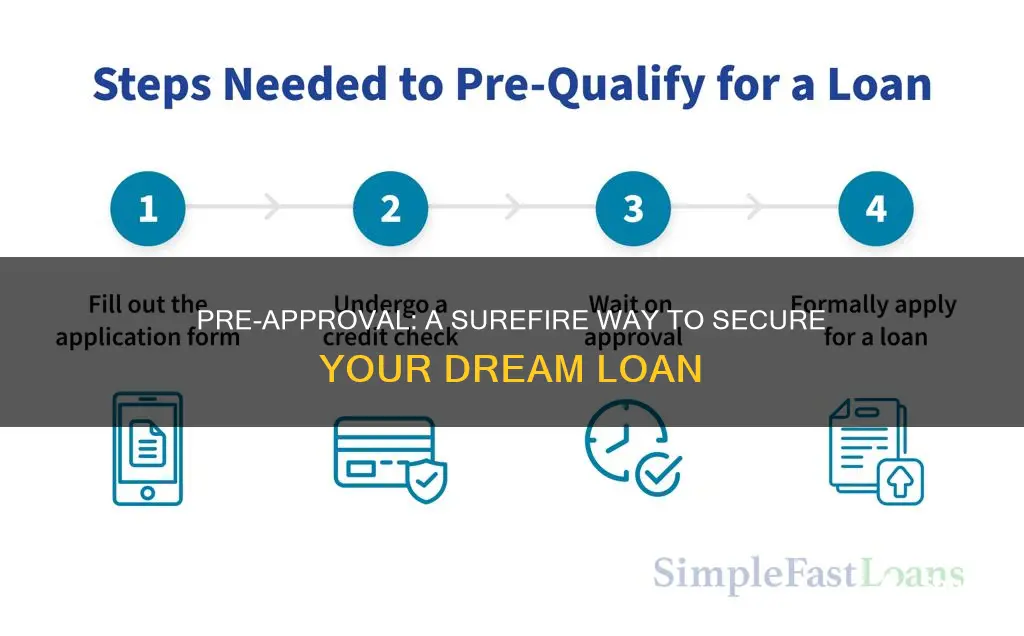
Pre-approval for a loan is an important step in the home-buying process, but it does not guarantee that you will receive the loan. A pre-approval offer letter is a statement from a lender indicating their tentative willingness to lend money to you up to a certain amount. This letter is based on assumptions and a preliminary review of your financial situation, including your income, assets, debts, and credit history. While pre-approval establishes your credibility as a potential borrower and can give you an idea of how much you can borrow, it is not a promise or commitment that you will ultimately secure the loan.
Does pre-approval guarantee a loan?
| Characteristics | Values |
|---|---|
| Pre-qualification | A preliminary step to determine the size of a mortgage |
| Pre-approval | A more involved step that signals what a lender can offer |
| Pre-approval guarantee | Not guaranteed, but a good indicator |
| Pre-approval process | A thorough review of a borrower's profile |
| Pre-approval letter | A statement from a lender that they are tentatively willing to lend money |
| Pre-approval and self-employment | May be more difficult, lenders will triple-check information |
| Guaranteed mortgage pre-approval | A fully underwritten pre-approval, the strongest option for buying a home |
What You'll Learn

Pre-qualification is a less involved process than pre-approval
Pre-qualification and pre-approval are two terms used interchangeably by lenders, but they are distinct processes with different purposes. Pre-qualification is a less involved process than pre-approval. It is a preliminary step to determine the size of a mortgage one could get. It is based on the data submitted by the borrower and is a preliminary estimate of the mortgage size they could qualify for. Pre-qualification can be completed in just a few minutes with basic information like income and expected down payment. It can be done online, in person, or over the phone. It is a good way to gauge how much money a financial institution is willing to lend.
On the other hand, pre-approval is a more comprehensive and lengthy process that requires more thorough verification of the borrower's credit history and other financial information. It is a conditional approval for the loan amount the borrower is expected to borrow. It is a more accurate estimate of what the borrower will be approved for once they are ready to complete a mortgage application. The lender will determine exactly how much the borrower can be pre-approved to borrow.
Pre-qualification is a less detailed process that can be useful for narrowing down lenders and getting a rough estimate of what one can borrow. It is a good starting point for first-time home buyers or those in the early stages of considering a home purchase. Pre-approval, on the other hand, is a more involved process that signals what a lender can offer and shows that the buyer is serious about purchasing.
While both pre-qualification and pre-approval are steps towards securing a loan, neither guarantees that a loan will be provided by the lender.
OppLoans: Hard Pull or Soft Inquiry?
You may want to see also

Pre-approval does not guarantee the final loan amount
Pre-approval is an important step in the home-buying process. It helps you shop for a home and shows sellers that you are a serious buyer. However, it is essential to understand that pre-approval does not guarantee the final loan amount.
When you get pre-approved for a loan, it means that a lender has reviewed your financial situation and determined that you meet their requirements to be approved for a loan. The lender will consider your income, assets, debts, and credit record to determine how much money you can borrow and what your interest rate will be. However, it is important to note that pre-approval is not a guarantee of the final loan amount.
There are several reasons why pre-approval may not lead to a guaranteed loan offer. Firstly, a pre-approval letter is typically based on assumptions and the information provided by the borrower. Lenders may discover new information during the full underwriting process that changes what they are willing to offer. For example, if there are any discrepancies or issues with the documentation provided, it could impact the final loan amount.
Additionally, pre-approval letters usually have an expiration date, typically between 30 to 90 days. During this time, many things can change, such as your income, credit history, or interest rates. If your financial situation changes significantly, it could affect the final loan amount or even result in a decline.
Furthermore, in the case of purchasing a home, unexpected issues may arise during the home inspection that could impact the lender's decision. For example, if major plumbing issues or other undisclosed problems are discovered, the bank may reconsider their offer.
While pre-approval does not guarantee the final loan amount, it is still a valuable step in the process of securing a loan. It provides a more precise estimate of how much a financial institution is willing to lend and demonstrates to sellers that you are a credible buyer. However, it is important to be mindful of the potential changes that can occur between pre-approval and the final loan offer.
Title Loans in Ohio: What You Need to Know
You may want to see also

Pre-approval is a good way to prove to sellers that you can receive financing
Pre-approval is a great way to prove to sellers that you can receive financing. It establishes your credibility as a buyer and shows that you are serious about making a purchase. While it does not guarantee a loan, pre-approval indicates that a lender has reviewed your financial situation and determined that you meet at least some of the requirements to be approved for a loan. This can include your income, debt, assets, and credit history.
The pre-approval process is more comprehensive and takes longer than pre-qualification, as it involves a thorough investigation of your financial background and credit history. It provides a more precise estimate of how much a financial institution is willing to lend you. This estimate is typically outlined in a pre-approval offer letter, which specifies the amount of money a bank is willing to loan you. However, it is important to note that this amount is not a guarantee, as the lender may discover new information during the full underwriting process that changes what they are willing to offer.
Obtaining a pre-approval offer letter can be beneficial in a competitive housing market or when you are ready to make an offer on a house. It demonstrates to sellers that you are a legitimate buyer who can afford their house and are not just window-shopping. This can be especially important when inventory is limited, as sellers will likely receive multiple offers. By having a pre-approval letter, you can communicate to sellers that you are a strong contender who is likely to secure financing.
Additionally, a pre-approved borrower may qualify for an interest rate lock under certain circumstances or a floating rate tied to market conditions. This can provide some stability in terms of interest rates during the home-buying process. Overall, pre-approval is a valuable step that can enhance your credibility, demonstrate your commitment, and increase your chances of securing financing for your dream home.
PNC Loans in Texas: What You Need to Know
You may want to see also

Pre-approval is a thorough look at your finances
Pre-approval is a more thorough process than pre-qualification, and it involves a lender taking a detailed look at your finances to determine how much money they are willing to lend you. They will review your income, debt, assets, and credit history to assess how much money you can borrow and how much you could pay per month.
The pre-approval process can be lengthy, as it requires a comprehensive investigation of your credit history and other financial information. Lenders will typically check your credit score and may also consider your employment history and personal income to support the loan. They will also look at how regularly you have paid your expenses, such as rent and utility bills.
The pre-approval offer letter will specify the amount of money the lender is willing to loan you. However, it is important to note that pre-approval does not guarantee the final loan amount. Lenders may discover new information during the full underwriting process that could change their offer. Additionally, pre-approval letters usually have an expiration date, typically between 30 to 90 days, after which you will need to update your paperwork.
While pre-approval does not guarantee a loan, it provides a more precise estimate of the lender's willingness to lend and demonstrates your credibility as a borrower. It shows sellers that you are a serious buyer with your finances in order and that you are likely to qualify for a loan.
A guaranteed mortgage pre-approval, also known as a fully underwritten pre-approval, is the strongest option for homebuyers. It indicates that you have already gone through the lengthy part of the mortgage process, and it significantly shortens the time frame from offer to closing.
PMI: A Lifetime Cost or Temporary Expense?
You may want to see also

Pre-approval is a fully underwritten loan
Pre-approval for a loan is a desirable step in the process of buying a home or car, but it does not guarantee that a loan will be offered. It is, however, a good indicator that a buyer is committed and able to secure financing. A pre-approval letter outlines the amount of money a bank is willing to loan, but it is not a commitment to that amount.
A fully underwritten pre-approval is a more secure guarantee of a loan. This process involves a more in-depth investigation of a borrower's financial situation, including their income, assets, and tax returns. An underwriter evaluates the risk associated with granting a loan and then either signs off on a commitment to give a loan or rejects the application. This process takes longer and is more intensive, but it provides a stronger indication of the borrower's ability to secure a loan.
In a competitive housing market, a fully underwritten pre-approval can make a buyer's offer more attractive. It demonstrates that the buyer is serious and has a lower risk of encountering issues that would prevent them from closing the deal. This type of pre-approval also allows for a quicker closing since the buyer has already gone through the majority of the loan process.
While a fully underwritten pre-approval significantly increases the chances of obtaining a loan, it is not an absolute guarantee. There is still a possibility that unforeseen issues or changes in the borrower's financial situation could impact the final approval decision. However, compared to a standard pre-approval, it provides a higher level of assurance for both the buyer and the seller.
Explore One Main Financial's Loan Options with a Cosigner
You may want to see also
Frequently asked questions
No, pre-approval does not guarantee a loan. It is a conditional approval, which means that the lender has reviewed your financial situation and determined that you meet some of their requirements to be approved for a loan.
Pre-qualification is a preliminary step to determine the size of a mortgage you could get. It is a less involved step, with fewer verification steps. Pre-approval, on the other hand, is a more comprehensive and lengthy process that requires a thorough investigation of the borrower's credit history and financial information.
Pre-approval has several advantages. It establishes your credibility as a buyer and shows that you are serious about making a purchase. It can also help you determine how much money you can borrow, allowing you to focus on homes or cars within your budget. Additionally, pre-approval can make your offer more competitive and speed up the process from offer to closing.







